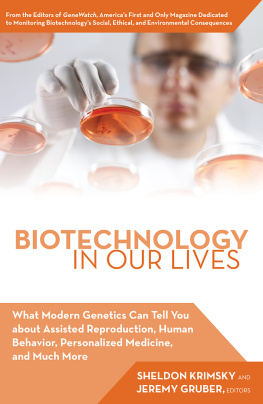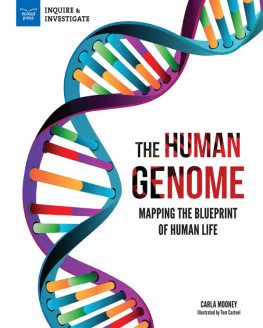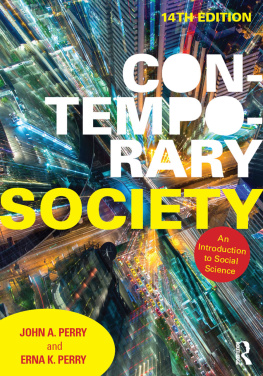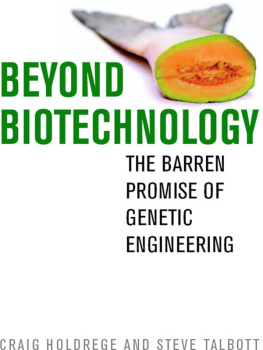SPLICING LIFE?
Cardiff Papers in Qualitative Research
About the Series
The Cardiff School of Social Sciences at Cardiff University is well known for the breadth and quality of its empirical research in various major areas of sociology and social policy. In particular, it enjoys an international reputation for research using qualitative methodology, including qualitative approaches to data collection and analysis.
This series publishes original sociology research that reflects the tradition of qualitative and ethnographic inquiry developed at Cardiff in recent years. The series includes monographs reporting on empirical research, collections of papers reporting research on particular themes and other monographs or edited collections on methodological developments and issues.
Splicing Life?
The New Genetics and Society
PETER GLASNER
ESRC Centre for the Economic and Social Aspects of Genomics, Cardiff University
HARRY ROTHMAN
Institute for Enterprise and Innovation, Nottingham University Business School
First published 2004 by Ashgate Publishing
Published 2017 by Routledge
2 Park Square, Milton Park, Abingdon, Oxon OX14 4RN
711 Third Avenue, New York, NY 10017, USA
Routledge is an imprint of the Taylor & Francis Group, an informa business
Copyright Peter Glasner and Harry Rothman 2004
Peter Glasner and Harry Rothman have asserted their right under the Copyright, Designs and Patents Act, 1988, to be identified as the authors of this work.
All rights reserved. No part of this book may be reprinted or reproduced or utilised in any form or by any electronic, mechanical, or other means, now known or hereafter invented, including photocopying and recording, or in any information storage or retrieval system, without permission in writing from the publishers.
Notice:
Product or corporate names may be trademarks or registered trademarks, and are used only for identification and explanation without intent to infringe.
British Library Cataloguing in Publication Data
Glasner, Peter
Splicing life? : the new genetics and society. - (Cardiff papers in qualitative research)
1. Genetic engineering - Social aspects 2. Genetic engineering - Economic aspects 3. Genetic engineering - Political aspects 4. Biotechnology - Social aspects 5. Biotechnology - Economic aspects 6. Biotechnology - Political aspects
I. Title II. Rothman, Harry, 1938-
306.46
Library of Congress Cataloging-in-Publication Data
Glasner, Peter E.
Splicing life? : the new genetics and society / Peter Glasner and Harry Rothman.
p. cm. -- (Cardiff papers in qualitative research)
ISBN 0-7546-3238-5
1. Medical genetics--Social aspects. 2. Human geneticsSocial aspects. 3. Genetic engineering--Social aspects. I. Rothman Harry, 1938- II. Title. III. Series.
RB155.G56 2004
303.483--dc22
2003063798
ISBN 13: 978-0-7546-3238-2 (hbk)
Contents
This monograph is the result of a programme of work called Our Genetic Inheritance, begun at the time we established the Science and Technology Policy Unit as a designated research centre of the University of the West of England, Bristol in 1987. We would like to thank those staff and students at UWE who supported SCITEC and its work in this area until its demise in 2001. In particular we would like to express our appreciation to our various research staff, including Cameron Adams, David Travis, Peter Scott and Wan Ching Yee. Without their hard work on our behalf, much of this book would never have been written.
It would be invidious to single out only a few of our many friends and colleagues who have helped us clarity our thoughts and ideas as the Human Genome Project unfolded. However, Harry Rothman would like to thank Julian Lowe for inviting him to give a series of seminars in the School of Business at the University of Ballarat, Victoria, Australia in 2001, which form the basis of . We would also like to thank David Green, originally of Carfax and now at Taylor and Francis, for his faith and support in our successful venture to establish New Genetics and Society as a leading international journal in this field. We have greatly benefited from the inputs of its authors, reviewers and editors. Our thanks go to Sean Rothman for his editorial help and advice. We are also delighted to thank Jackie Swift for her patience and good humour while producing camera ready copy for the publisher.
We would like to thank those organisations who funded some of the research on which this book is based, including the Economic and Social Research Council, the Medical Research Council (Human Genome Mapping Project Resource Centre, Hinxton), the Department of Trade and Industry, The British Council, the Welsh Institute for Health and Social Care, the European Commission (Institute for Prospective Technological Studies, Seville), and the University of the West of England.
Some of the material in this book is developed from papers we have given, and from articles that we have published over the years, including: H Rothman 1994 ().
The new genetics (including genetic engineering, mapping of human and other species, genetic diagnosis and therapy) forms the scientific basis of new technologies unlike any other, with significant implications for life in the twenty-first century. These geno-technologies directly affect us at a deeply personal level; they pose a threat to the boundaries which conventionally define selfhood and distinguish humans from other animals; they generate potentially novel risks and dangers, with possibly unforeseen, and often unknowable or irreversible outcomes; and they threaten the very basis of accepted understandings of culture and society. They also grow in a complex political, economic and organisational milieu involving science, medicine, commerce and the law in the context of late modern society characterised by risk, reflexivity and globalisation. The new genotechnologies therefore appear to question the very boundaries of Nature itself. Recognising how these boundaries are configured contributes to understanding how society reinvents them through imposing order, reimposing control, and providing space for decision-making and the development and application of policy. It also allows for a critical analysis of the degree to which such processes serve the interests of the many constituencies involved.
The New Genetics
The purpose of this chapter is to introduce the idea of the new genetics, and its historical relation to classical genetics and biotechnology. We outline why the new genetics is considered qualitatively different from other new technologies in terms of its impact. The communist geneticist J.B.S. Haldane in 1946 saw the future of genetics as being bound up with enumerating and locating all human genes and elucidating their biochemical functions; to provide us with an anatomy and physiology of the human nucleus [giving] the possibility of a scientific eugenics, [it] may give us the same powers for good or evil over ourselves as the knowledge of the atomic nucleus has given us over parts of the external world (cited by Dawes 1952: 181). These were prescient words, but when spoken classical genetics was in no position to deliver on such goals; for that to happen a new genetics would need creating.








